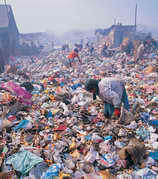 Johannesburg, 4 September- Efforts to promote sustainable development received a major boost as the World Summit on Sustainable Development concluded with significant commitments to improve the lives of people living in poverty and to reverse the continuing degradation of the global environment. Johannesburg, 4 September- Efforts to promote sustainable development received a major boost as the World Summit on Sustainable Development concluded with significant commitments to improve the lives of people living in poverty and to reverse the continuing degradation of the global environment.
Some 12,600 delegates - including government officials, journalists and members of non-governmental organizations showed up. About 50,000 people participated, making it the largest one in U.N. history.
Aiming for its largest gathering, the United Nations opened the global summit to seek ways of protecting nature while boosting living standards for the world's poorest people.
The summit held in a convention center which is attached to a shopping mall and business complex, was sealed off by concrete barriers and metal fences. An 8,000-person security force was deployed to help prevent the kind of violence happened in past years' international meetings in Seattle and Genoa, Italy.
Unlike the 1992 Earth Summit in Rio de Janeiro, which opened with two minutes of silence for a "dying" planet, delegates here immediately delvedsintospragmatic assessments of the world's most pressing needs.
During the summit
The five official themes for the meeting are water and sanitation, energy, agricultural productivity & food security, biodiversity and ecosystem management, and health. It was expected to come up with a new action plan that contains more concrete, practical ways of achieving sustainable development than the Rio summit came up with.
The overriding theme of the summit was to promote action and major progress was made in Johannesburg to address some of the most pressing concerns of poverty and the environment. Commitments were made to increase access to clean water and proper sanitation, to increase access to energy services, to improve health conditions and agriculture, particularly in dry lands, and to better protect the world's biodiversity and ecosystem.
In the opening speech, South African President Thabo Mbeki said the world has an urgent obligation to narrow the divide between the rich and the poor.
UN General Secretary Kofi Annan urged rich countries to take the lead in getting rid of unsustainable practices and protecting the global environment. On the sidelines of the summit, Addressing the world leaders, Kofi Annan said that the most important target to achieve at this summit is responsibility, responsibility for each other, especially for the poor, the vulnerable, and the oppressed, as well as responsibility for the future, for our children and for their children.
He noted that conservation of the environment may be expensive, but the cost of failure to protect it is far greater. He stressed the importance of integrating civil society and businesssintosgovernment efforts to realize sustainable development.
"Saving the earth need not cost the earth." That was the message spelled out by world leaders gathering in Johannesburg for the World Summit on Sustainable Development.
Annan said action, not catchword, was necessary if the planet was not to suffer permanent damage that put human life at risk. Non-governmental organizations from all over the world have come to Johannesburg, voicing their concern over the deteriorating global environment and urging governments to do more.
Results and fruits
 As a result of the Summit, governments agreed on a series of commitments in five priority areas that were backed up by specific government announcements on programme, and by partnership initiatives. More than 220 partnerships, representing million in resources, were identified during the Summit process to complement the government commitments, and many more were announced outside of the formal Summit proceedings. As a result of the Summit, governments agreed on a series of commitments in five priority areas that were backed up by specific government announcements on programme, and by partnership initiatives. More than 220 partnerships, representing million in resources, were identified during the Summit process to complement the government commitments, and many more were announced outside of the formal Summit proceedings.
Water--Major new partnerships which will help reach the water and sanitation targets were announced. The European Union Water Initiative will help millions in Africa gain access to clean drinking water and sanitation facilities.
Energy--Energy has for the first time in a major Summit been raised as a central concern of the global community. A link to the Millennium Declaration Goals will mean global action co-ordinated by the UN. Countries collectively agreed to focus on developing renewable sources of energy including promoting technology transfer and financing projects in developing countries.
Agriculture and food security--There is a new focus on food security as a global challenge. It addressed in an integrated way blockages of trade, vulnerabilities arising from climatic change and interventions to enable greater productivity.
Health--Important goals and targets from previous conventions and summits were strengthened. The WTO/TRIPS agreement on intellectual property rights was confirmed facilitating access to affordable drugs for major health problems, including TB, malaria and HIV/AIDS.
The implementation plan brought new focus on children and tooksintosaccount fundamental freedoms, including those of women. WSSD prompted the formation of a new global partnership joining role-players from all sectors in action to promote healthy environments for children to grow up.
Housing--As part of the response to rapid urbanization in developing countries WSSD (World Summit on Sustainable Development) fostered on integrated approach to sustainable urbanization with emphasis on improving the quality of life of slum dwellers through informal settlement upgrading programme.
Biodiversity--Agreements on biodiversity will bring great benefits to developing countries. Targets were achieved despite strong opposition from some developed countries and biodiversity protection will be extended to the oceans, it was agreed.
Trade--Far-reaching agreement clarity was reached on the relationship between the WTO rules on trade and the system of global environmental governance as two systems of equal status.
"This Summit makes sustainable development a reality," United Nations Secretary-General Kofi Annan said at a closing press conference in Johannesburg. "This Summit will put us on a path that reduces poverty while protecting the environment, a path that works for all peoples, rich and poor, today and tomorrow."
In addition, for the first time countries adopted commitments toward increasing the use of renewable energy "with a sense of urgency," Although a proposed target for this was not adopted.
But rather than concluding with only the words of an agreed document, the Summit has also generated concrete partnership initiatives by and between governments, citizen groups and businesses. These partnerships are bringing with them additional resources and expertise to attain significant resultsswheresthey matter- in communities across the globe.
Heads of state and government from more than 190 countries agreed to share responsibility and take immediate action to ensure a secure and prosperous future for the global population.
They also recognize that the outcome of the latest summit should benefit all, but particularly women, youth, children and vulnerable groups.
"The Summit represents a major leap forward in the development of partnerships," Mr. Annan said, "with the UN, Governments, business and civil society coming together to increase the pool of resources to tackle global problems on a global scale."
The Ministers of Environmental Affairs and Tourism and Foreign Affairs hailed the World Summit as an outstanding success. Speaking at the end of the summit the Ministers, in a joint statement expressed that the World Summit on Sustainable Development has opened the way for the world to take new strides in the foremost challenge of our time - the eradication of poverty and closing the gap between rich and poor, combined with protection of the environment.
Difficulties lie ahead
But breakthroughs are yet to be made in such tough areas as the targets for expanding access to sanitation, achieving a certain level of renewable energy, subsidies and a provision urging the ratification of the Kyoto Protocol on climate change.
A path to prosperity that ravages the environment and leaves a majority of humankind behind in squalor will soon prove to be a dead-end road for everyone.
Apart from government efforts, the role of the civil society groups and commercial enterprises should be enhanced to achieve sustainable development.
Pressure has also come from the younger generation.
These challenges were inspired, written and voted on by some 400 children from 80 countries and represent their hopes and fears for the future of the planet.
Developing nations are trying to extract more aid and greater access to Western markets and technology from the summit. The United States is resisting any new aid targets or timetables, while demanding that aid recipients reduce corruption. Officials from the United States and the European Union were at odds over the usefulness of targets and timetables for issues like sanitation. The EU considers setting specific goals central to the summit's agenda, while U.S. officials say launching projects is more important than documents.
The U.S. delegation has played down the importance of the summit's final documents, saying they were secondary to the potential to launch "results-oriented" projects.
Many environmental activists were disheartened by the United States' continuing resistance to setting firm timetables for action.
Every time targets come up, the U.S. puts a line through it," said Gordon Shepherd, an official with the World Wildlife Fund.
Even the EU is at odds with the United States, agreeable to binding targets in some areas such as sanitation. According to the United Nations, 2.2 million people in the developing world die each year from diseases associated with lack of safe water and inadequate sanitation.
Kofi Annan dismissed the excuse of technological barriers when striving for a better environment, saying that "the policies, the science and the green technologies at our disposal today can begin to do the job."
Annan believed efforts should particularly be enhanced on the five areas, namely water, energy, health, agriculture and biodiversity.
"We set ourselves the task of ensuring a balance of the three pillars of sustainable development - economic, social and environmental - and a focus on poverty eradication. It was essential to mobilize new resources and new energy behind a practical implementation plan."
"Targets with timetables are at the core of our agenda," said EU official Christine Day. "They alone will make the international community accountable for delivering on its promises."
The true test of what the Johannesburg Summit achieves, Mr. Annan said, are the actions that are taken afterward. "We have to go out and take action. This is not the end. It's the beginning."
Looking back...
This is the second time that a leaders' summit has been held by the United Nations on the issue of sustainable development.
In 1992, the summit in Rio de Janeiro adopted the Rio Principles and the Agenda 21, which have been regarded as the guidelines towards sustainable development.
But the global environment has deteriorated over the past decade despite a record number of international agreements drafted and signed. Too much had been said but not a great deal had been done to reverse the trend.
1972
With the convening of the United Nations Conference on the Human Environment, held in Stockholm, the environment became an international issue.
In 1992
The United Nations Conference on Environment and Development (UNCED), popularly known as the Earth Summit, hosted by the United Nations, was held in Rio de Janeiro, Brazil, in June 1992.
June 1997
At the Earth Summit+5 special session of the United Nations General Assembly, governments agreed on a programme of action for further implementation of Agenda 21.
December 2000
The United Nations General Assembly decided to hold a World Summit on Sustainable Development in 2002, to reinvigorate at the highest political levels the global commitment to sustainable development agreed upon ten years ago at the Rio Earth Summit.
| ![]() 本网站由北京信息港提供网络支持
本网站由北京信息港提供网络支持
![]() 本网站由北京信息港提供网络支持
本网站由北京信息港提供网络支持